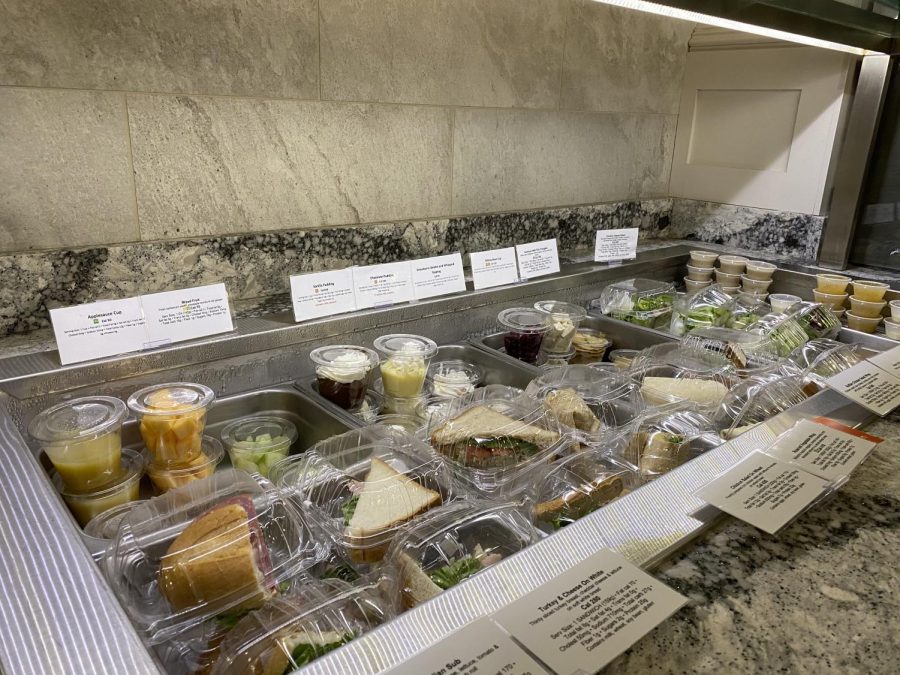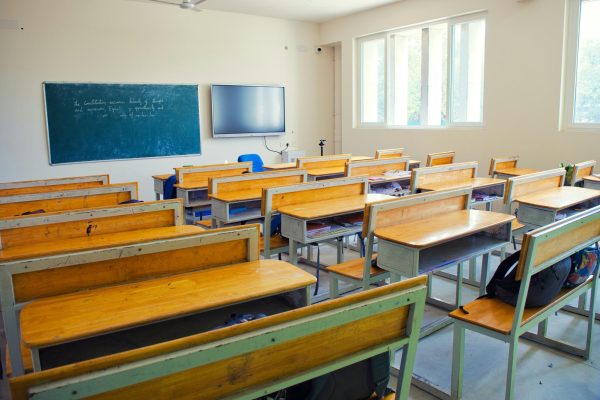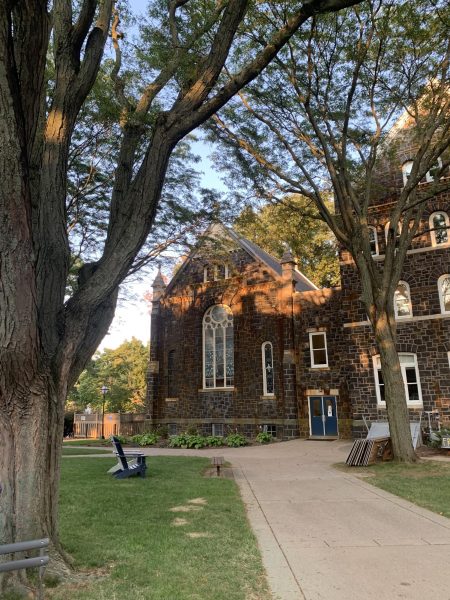Rant of the Week: The Plastic Pandemic Inside MoCo’s Dining Halls
For years we have been working hard to cut back on throw-away plastics like plastic straws and bags in an effort to reduce plastic pollution.
At the on-set of the COVID-19 pandemic, many of these efforts and any progress made towards less plastic consumption seemed to have been cast aside by nearly every establishment for the sake of keeping things sanitary — Moravian College’s dining halls have been no exception.
But are single-use plastics really what we need to prevent the spread of the virus, or could we be doing better to look out not only for our health, but for our planet as well?
Since their rise in popularity during the early ‘70s, single-use plastics have become a major part of our everyday lives as consumers. Almost everything you can buy at your local grocery store or supermarket is packaged in a plastic wrapper or a plastic bottle, and most of this plastic is thrown out almost immediately upon purchase or consumption.
From a corporate standpoint, turning to plastic makes sense. Plastic is a durable and versatile material that is cheap to produce, no doubt making it an enticing option for businesses looking for a cost-effective way to package their products.
From an environmental standpoint, however, plastic is a material that is non-biodegradable, a major contributor to the pollution of our planet, and a great threat to our earth’s ecosystems.
In the midst of a global pandemic, maintaining clean and properly sanitized eating areas should obviously be of utmost concern, especially on a college campus. To reduce the amount of people eating in the dining areas, Dining Services now provides to-go boxes.
These washable containers allow students to order food and eat elsewhere, either on campus or in their dorms. These boxes are then returned to the dining locations by students, washed, and then reused again and again.
The issue concerning the dining hall’s troubling single-use plastic usage lies in the grab-and-go stations located inside of the eat-in dining locations on campus.
These stations feature a variety of foods like sandwiches, wraps, salads, etc., which are made available for students looking for a quick bite in-between classes. Convenient, yes, but every item in these grab-and-go stations are set out in their own individual plastic box—even condiments. For a full grab-and-go meal, a student would typically grab a sandwich/wrap/salad, a snack, a desert, a plastic water bottle, and maybe a condiment.
With just that one meal, that student will throw away at least five separate plastic containers alone.
Keeping in mind that over 12.7 million metric tons of plastic end up in our world’s oceans per year (which doesn’t account for what also ends up in landfills), there has to be a better way for our dining halls to reduce waste while meeting sanitation requirements amid the pandemic.
If the dining halls are able to give students reusable to-go boxes for the main course meals of the day, why can’t they do the same for the grab-and-go meals? Pre-made grab-and-go items could be held behind the counter so that students can ask dining staff for what they want, and then they can have their meals placed in the reusable to-go box.
Or if that process might take away from the convenience of the grab-and-go station, paper packaging might be an option to consider.
While paper products are not so environmentally-friendly either, at the very least they are biodegradable. That being said, paper products don’t always have to come from trees. Companies are now beginning to come out with fully biodegradable food packaging made from hemp that is cheap and almost, if not as durable as plastic packaging without further polluting our planet at every meal.
Of course, keeping students healthy and safe on campus throughout this pandemic should be our main concern, but the pandemic will end eventually.
The same can’t be said for climate change, especially at the rate that we’re going.
If we can figure out a solution that combines both cleanliness and safety with environmentally-friendly alternatives to single-use plastics in our campus dining halls, we as a community can help to reduce our overall waste and contribution to the downfall of our planet’s wellbeing.
Dining Services did not respond to a request for comment.












Dining Services • Nov 10, 2020 at 3:47 pm
Unfortunately, we didn’t have a chance to respond before Samantha’s article was published. But I did want to explain a couple of things on behalf of Dining Services with regards to the plastic and paper containers we use.
Ultimately, the safety of our staff and our patrons is what has driven a lot of our policies and procedures this semester. As dining spaces are where students, staff and faculty will congregate indoors for prolonged periods of time, it’s our job to ensure our service is quick (to avoid lines and waiting in close proximity) as well as to limit the contact between patrons and our staff. Please read below for the various reasons we made certain decisions this semester.
Ultimately, however the availability of the green container program depends on students returning the containers. See more info below on the statistics regarding our return rate of containers.
Sam’s Question 1. –If reusable containers that are returned to the dining halls and washed are made available to students at both dining halls, why is it necessary to also have individually wrapped food items? Why not serve food on washable dishes?
We debated as to whether to use reusable containers for a long time and the one element that was most important to us was health and safety, primarily because our employees would have to touch and empty the used food containers to clean them. In addition, we wanted to keep guests safe and eliminate their exposure to food waste on china dishes in the dish drop area. We decided to implement reusable containers as an option as long as there could be a distant drop off where the containers could be collected in plastic bags and brought back to the dish room to be cleaned and sanitized. Fewer dishes being washed decreases risk of transmission to our employees, and that’s why we are not using china. Also, we presumed that many students wouldn’t necessarily want to dine-in and prepping all of our food as to-go speeds customers through our lines and back out the door. We definitely did not want to encourage bottlenecks or lingering in certain areas of the dining room and packaging everything to go and keeping students from congregating by the dish drop area helps with that.
Relating to part two of your question regarding individually wrapped food items: our priority is the health and safety of our guests and employees. We want to avoid lines and a lot of people congregating in one space for a long period of time to maintain recommended CDC and PA state protocols with indoor dining (as mentioned above). Right now, we are limited with our dining room capacity (at 50%), which means we can only have 150 people in The Star at any given time, which includes 15-20 employees. In order to keep lines and waiting to a minimum, we need to make sure our speed of service is as fast as possible, which is why we have individually wrapped items available – it has allowed our customers quick turnaround time with their busy schedules/classes.
Sam’s Question #2: The grab-and-go areas at both north and south campus dining halls feature an abundance of individually packaged food items which are meant to make grabbing a quick meal easier and more convenient for students. If other foods are able to be handed/served directly to students by dining staff for those who are dining-in, why can’t grab-and-go foods follow a similar protocol allowing students to have pre-made sandwiches/salads/etc. given to them in a reusable and washable container for them to return when they next visit the dining hall?
Our answer: The answer to the first part of your question is essentially the same as the answer to your first question: our priority is keeping everyone safe and healthy and by keeping our service fast and efficient, we keep people moving in and out of our dining spaces. Having to individually plate some foods and not others based on asking each customer what they’d like would dramatically slow down our speed of service and increase time/exposure to others in those spaces. Pre-packaging items before meal services facilitates this increased speed of service. We know that plastic clamshell containers aren’t ideal, but they are recyclable plastic. One of our other options was styrofoam, which we declined.
Another factor contributing to the lack of availability of reusable containers is that we are having compliance issues with students returning the green containers. For example, we are handing out over 700 green containers per week and only getting about 125 returned out of those 700 – which means nearly 600 containers a week are being thrown out or sitting in someone’s fridge or room. We invested in hundreds of cases of green containers (when previously we’d charge for them, which helped recoup our cost), but if they are being thrown out instead of reused and recycled, there are no sustainability benefits to using them. If students were returning them at 90-100%, we could talk about using them for other items, but we just don’t have enough containers being returned to justify that.
Sam’s question # 3: If reusable containers are not a viable option for grab-and-go foods, would the dining hall consider switching over to paper packaging over plastic packaging?
Our answer: Dining does use paper where we can. We use paper for our breakfast sandwiches/breakfast items. Sometimes it relates to the availability of certain products from our suppliers. Our supply chain has been affected by COVID pretty significantly, so sometimes some items get substituted – for example, we order certain containers from our suppliers that are not available, so they send alternates.
We have also gotten requests for clear containers so students can see their food/sandwiches before they select them. We were packaging sandwiches and salads in paper containers but there was more food waste occurring when students couldn’t see what they selected first.
We know that the changes related to COVID have been challenging for everyone involved and we try as best as possible to strike a balance and be sustainable while ensuring that we keep the traffic flowing through our dining locations as quickly as possible. It’s most important to us that our customers and employees are safe and healthy, and while we can’t be as sustainable as we’d all prefer with containers, we are still implementing a lot of sustainability initiatives behind the scenes, like composting pre-consumer food waste (90-120 gallons per week), cooking oil recycling, and using our Leanpath food waste system that has thus far reduced our food waste by 30% since we implemented it this semester. We are happy to talk about some of these initiatives as well as I’m not sure many students know about them!
-Christine Bainbridge, Marketing Manager